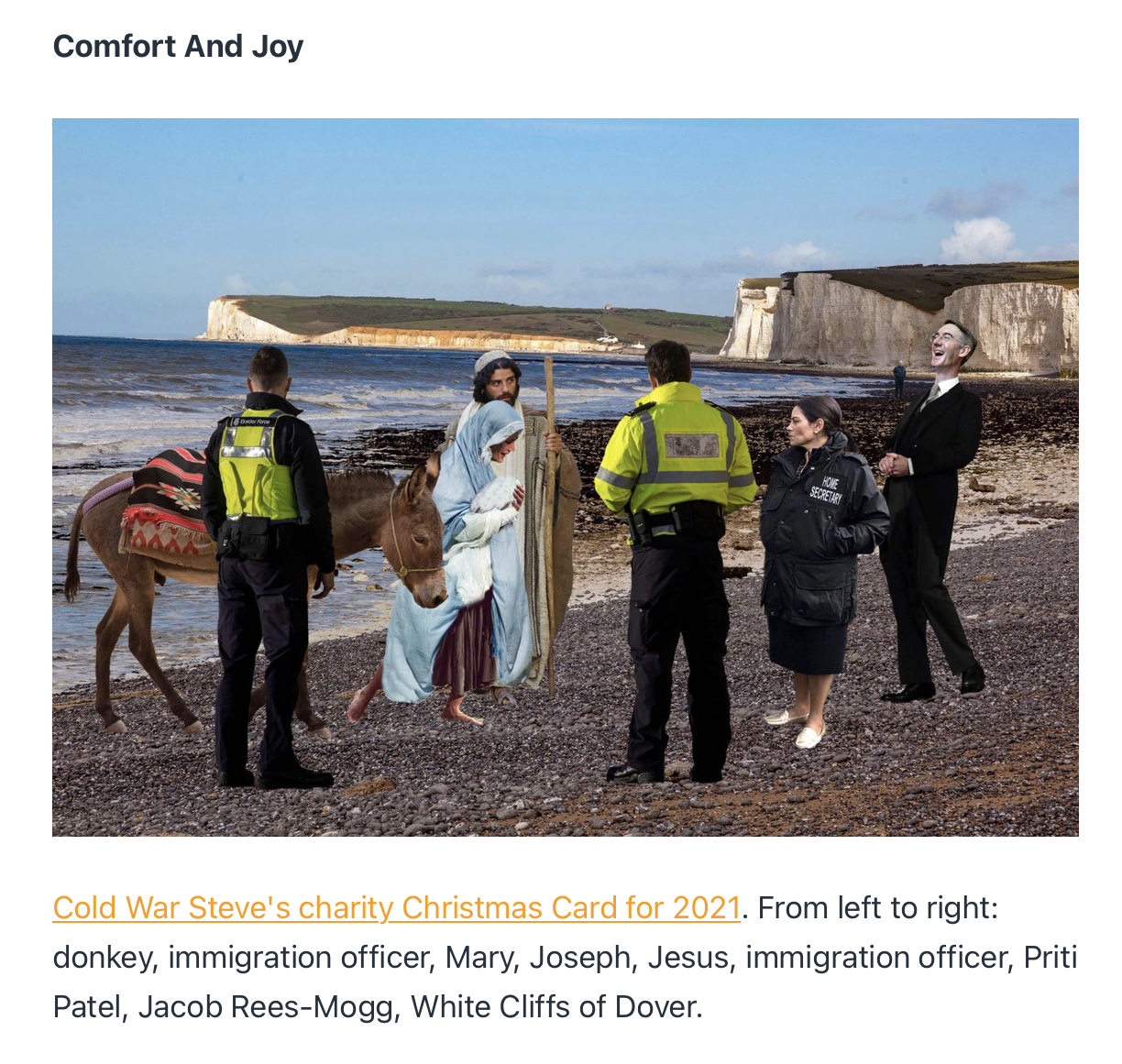Christmas in Toryland

The annual Cold War Steve charity Xmas cards have arrived !!! Pack of 5 cards (A5 size) for £10 – 100% of profit is going to @RefugeeAction
Quote of the Day
”We all get our closing parentheses. I’ve gone longer without closing mine than Kim did before closing his. That also makes me sad, not that I’m in a hurry. Being old means knowing you’re in the exit line, but okay with others cutting in. I just wish this time it wasn’t Kim. Britt Blaser says life is like a loaf of bread. It’s one loaf no matter how many slices are in it. Some people get a few slices, others many. For the sake of us all, I wish Kim had more.”
- Doc Searls, in a nice tribute to his friend Kim Cameron
Musical alternative to the morning’s radio news
Ghiribizzi | MS 43: No. 40 in A Major: Andante
Think of it as like a delicious starter for the day.
Long Read of the Day
How to Fix Social media
I know, I know — the Web is full of putative answers to this question. But this essay is a bit different because it’s by Nicholas Carr, who for years has been one of the most thoughtful and provocative writers on tech. What I particularly like about the piece is that — unlike other commentaries — it isn’t overwhelmed by the supposed exceptionalism of our present moment.
It’s a mistake … to assume that technological changes, even profound ones, render history irrelevant. The arrival of broadcast media at the start of the last century set off an information revolution just as tumultuous as the one we are going through today, and the way legislators, judges, and the public responded to the earlier upheaval can illuminate our current situation. Particularly pertinent are the distinctions between different forms of communication that informed the Supreme Court’s decision in the Carlin case — and that had guided legal and regulatory policy-making throughout the formative years of the mass media era. Digitization has blurred those distinctions at a technical level — all forms of communication can now be transmitted through a single computer network — but it has not erased them.
By once again making such distinctions, particularly between personal speech and public speech, we have an opportunity to break out of our current ideological bind and create a democratic framework for governing social media that is consistent with the country’s values and traditions.
It’s long, but historically informed and comes up with an interesting idea towards the end. Worth your time.
Anatomy of a cancellation, and its withdrawal.
Or: “Jordan Peterson and the Lobster”
Nice Economist piece about how to manage an appearance by a controversial speaker on a university campus.
To culture wars, it is worth considering what happened between Jordan Peterson and a large red lobster in Cambridge University on a recent evening. Namely, nothing. Which doesn’t mean it wasn’t important. On the contrary: how it came to pass that nothing was allowed to happen between Mr Peterson and a student dressed as a lobster matters a lot.
It’s a great story. Peterson appeared, gave a talk, went away. The sky didn’t fall in. And a vote to thanks to the lobster was passed.
My commonplace booklet
The Work of Living Goes On: Rereading Mrs Dalloway During an Endless Pandemic
A lovely essay by Colin Dickey on the dystopian undercurrents in Virginia Woolf’s Mrs Dalloway and the echoes he sees in our attempts to ‘move on’ from the pandemic.
And yet, the work of living goes on—doggedly, at times obscenely. We have not yet even begun to face the task of what we owe the dead, and we are nonetheless still faced with the question of what we owe the still living. There are birthday parties to plan, quarterly reports due, new books to read, new friends to make. Our faces are still turned toward the past, fixedly contemplating the single catastrophe of the past two years, wreckage upon wreckage, still wanting to wake the dead and make whole what’s been smashed, even as the storm called Progress propels us into the future.
Few books capture this moment like Virginia Woolf’s Mrs Dalloway, a novel obsessed with the question of how moving on can be possible. How can anyone have a party in the wake of the flood? It is a question the novel takes both rhetorically—how dare anyone have a party in such a time—and literally: how might it be possible to do such a thing? It is a novel about a broken, hobbled England, unable to face the wreckage of war and influenza and the death throes of its own empire, where nonetheless the work of the living persists, where, as the character Peter Walsh observes, “life had a way of adding day to day.”
It made my day, anyway.
This Blog is also available as a daily email. If you think that might suit you better, why not subscribe? One email a day, Monday through Friday, delivered to your inbox. It’s free, and you can always unsubscribe if you conclude your inbox is full enough already!
